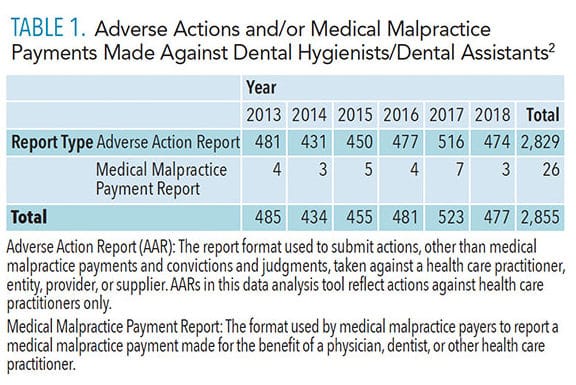What Type of Insurance Should I Purchase Before Starting Practice?
I am a recent graduate and am wondering what type of insurance I should purchase before starting practice.
QUESTION: I am a recent graduate and am wondering what type of insurance I should purchase before starting practice. Thank you!
Purchasing insurance prior to starting your career is a smart decision. Both professional liability (malpractice) and disability insurance should be obtained when practicing as a dental hygienist. Although not a common occurrence, dental hygienists can be sued for malpractice. Malpractice is defined as “a dereliction of professional duty or failure to exercise an ordinary degree of professional skill or learning by one rendering professional services which results in injury, loss, or damage.”1 Dental malpractice is a deviation from the standard of care and a failure to diagnose and/or treat a patient resulting in injury.1
According to the National Practitioners Database, in the past 5 years, 2,855 dental hygienists/dental assistants had adverse actions and/or medical malpractice payments made against them (Table 1).2 Dental hygienists can be named as part of a lawsuit against the dentist or individually for reasons such as failure to update the medical history, injury to the patient, and contributing to the failure to diagnose disease. Increasingly, dental hygienists are permitted to perform advanced or expanded procedures in many states, emphasizing the need for a malpractice policy. 
Dental hygienists should purchase malpractice insurance on their own and not through their employer. This allows you to work in multiple offices, change jobs, or work as a substitute. In addition, if a patient you treated filed a lawsuit that exceeds the limits of your employer’s policy, you may be liable. The amount awarded that exceeds the policy limit might involve payments from all employees of the dentist named in the lawsuit. Professional liability insurance is affordable (typically less than one day’s pay).
Disability insurance is another type of insurance that should be purchased, and it behooves dental hygienists to purchase their own policy. Dental hygienists rely on their salaries to provide a living and pay off educational loans. We depend on our physical and technical abilities to perform our jobs and we need to protect our health if something should happen, such as hand or wrist fractures or musculoskeletal disorders. Disability insurance is a means to maintain income in the event of a lapse in employment due to health reasons. The cost of disability insurance varies depending on age and circumstance, which will determine if a long-term or short-term policy is the best choice.
Life can be unpredictable. The benefit of carrying liability and disability insurance greatly outweighs the costs and will provide the dental hygiene practitioner with piece of mind.
REFERENCES
- MedPro Group. Dental Malpractice 101 for Students and Residents. Available at: http/://www.medpro.com/documents/10502/10739/DDS%20Student%20Handbook.pdf. Accessed May 20, 2019.
- National Practitioner Data Base. Data Analysis Tool. Available at: npdb.hrsa.gov/analysistool/. Accessed May 20, 2019.
From Dimensions of Dental Hygiene. June 2019;17(6):52.

